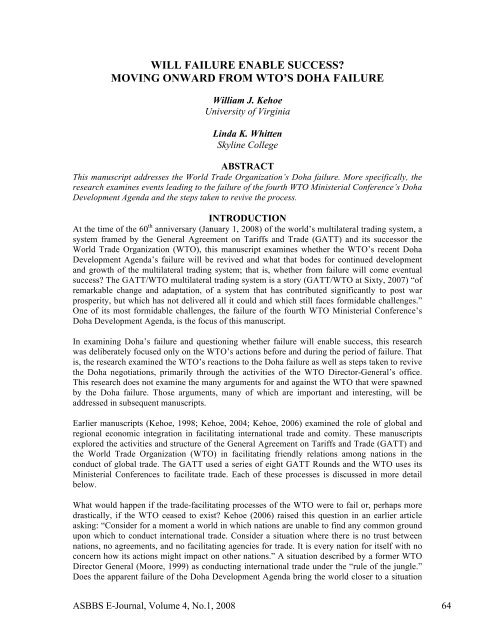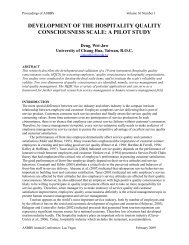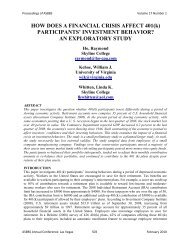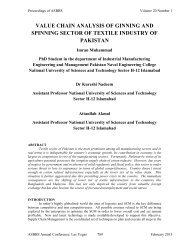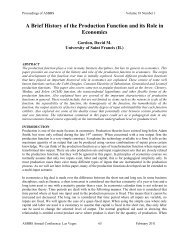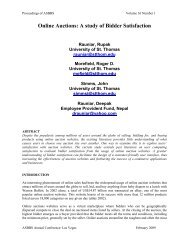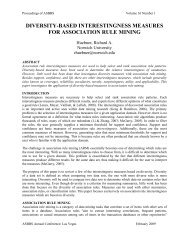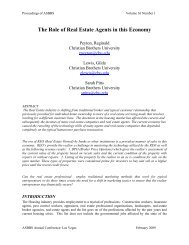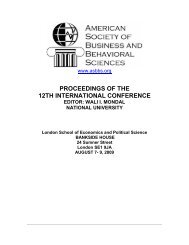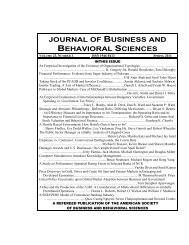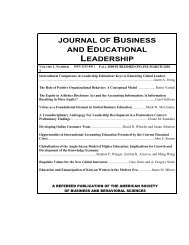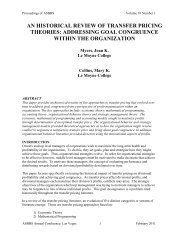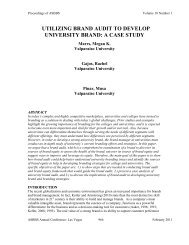stock repurchase announcements: a test of market ... - Asbbs.org
stock repurchase announcements: a test of market ... - Asbbs.org
stock repurchase announcements: a test of market ... - Asbbs.org
Create successful ePaper yourself
Turn your PDF publications into a flip-book with our unique Google optimized e-Paper software.
WILL FAILURE ENABLE SUCCESS?<br />
MOVING ONWARD FROM WTO’S DOHA FAILURE<br />
William J. Kehoe<br />
University <strong>of</strong> Virginia<br />
Linda K. Whitten<br />
Skyline College<br />
ABSTRACT<br />
This manuscript addresses the World Trade Organization’s Doha failure. More specifically, the<br />
research examines events leading to the failure <strong>of</strong> the fourth WTO Ministerial Conference’s Doha<br />
Development Agenda and the steps taken to revive the process.<br />
INTRODUCTION<br />
At the time <strong>of</strong> the 60 th anniversary (January 1, 2008) <strong>of</strong> the world’s multilateral trading system, a<br />
system framed by the General Agreement on Tariffs and Trade (GATT) and its successor the<br />
World Trade Organization (WTO), this manuscript examines whether the WTO’s recent Doha<br />
Development Agenda’s failure will be revived and what that bodes for continued development<br />
and growth <strong>of</strong> the multilateral trading system; that is, whether from failure will come eventual<br />
success? The GATT/WTO multilateral trading system is a story (GATT/WTO at Sixty, 2007) “<strong>of</strong><br />
remarkable change and adaptation, <strong>of</strong> a system that has contributed significantly to post war<br />
prosperity, but which has not delivered all it could and which still faces formidable challenges.”<br />
One <strong>of</strong> its most formidable challenges, the failure <strong>of</strong> the fourth WTO Ministerial Conference’s<br />
Doha Development Agenda, is the focus <strong>of</strong> this manuscript.<br />
In examining Doha’s failure and questioning whether failure will enable success, this research<br />
was deliberately focused only on the WTO’s actions before and during the period <strong>of</strong> failure. That<br />
is, the research examined the WTO’s reactions to the Doha failure as well as steps taken to revive<br />
the Doha negotiations, primarily through the activities <strong>of</strong> the WTO Director-General’s <strong>of</strong>fice.<br />
This research does not examine the many arguments for and against the WTO that were spawned<br />
by the Doha failure. Those arguments, many <strong>of</strong> which are important and interesting, will be<br />
addressed in subsequent manuscripts.<br />
Earlier manuscripts (Kehoe, 1998; Kehoe, 2004; Kehoe, 2006) examined the role <strong>of</strong> global and<br />
regional economic integration in facilitating international trade and comity. These manuscripts<br />
explored the activities and structure <strong>of</strong> the General Agreement on Tariffs and Trade (GATT) and<br />
the World Trade Organization (WTO) in facilitating friendly relations among nations in the<br />
conduct <strong>of</strong> global trade. The GATT used a series <strong>of</strong> eight GATT Rounds and the WTO uses its<br />
Ministerial Conferences to facilitate trade. Each <strong>of</strong> these processes is discussed in more detail<br />
below.<br />
What would happen if the trade-facilitating processes <strong>of</strong> the WTO were to fail or, perhaps more<br />
drastically, if the WTO ceased to exist? Kehoe (2006) raised this question in an earlier article<br />
asking: “Consider for a moment a world in which nations are unable to find any common ground<br />
upon which to conduct international trade. Consider a situation where there is no trust between<br />
nations, no agreements, and no facilitating agencies for trade. It is every nation for itself with no<br />
concern how its actions might impact on other nations.” A situation described by a former WTO<br />
Director General (Moore, 1999) as conducting international trade under the “rule <strong>of</strong> the jungle.”<br />
Does the apparent failure <strong>of</strong> the Doha Development Agenda bring the world closer to a situation<br />
ASBBS E-Journal, Volume 4, No.1, 2008 64


